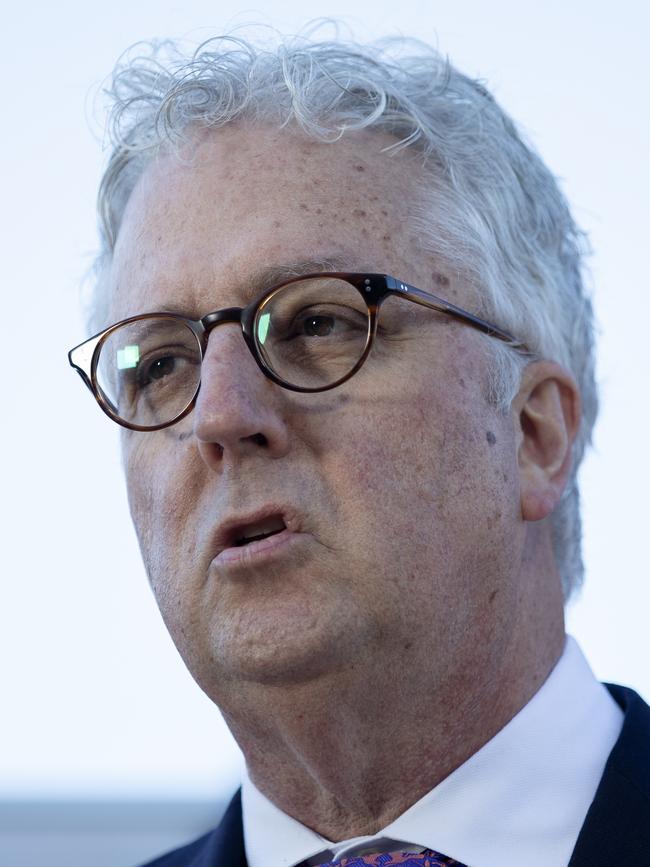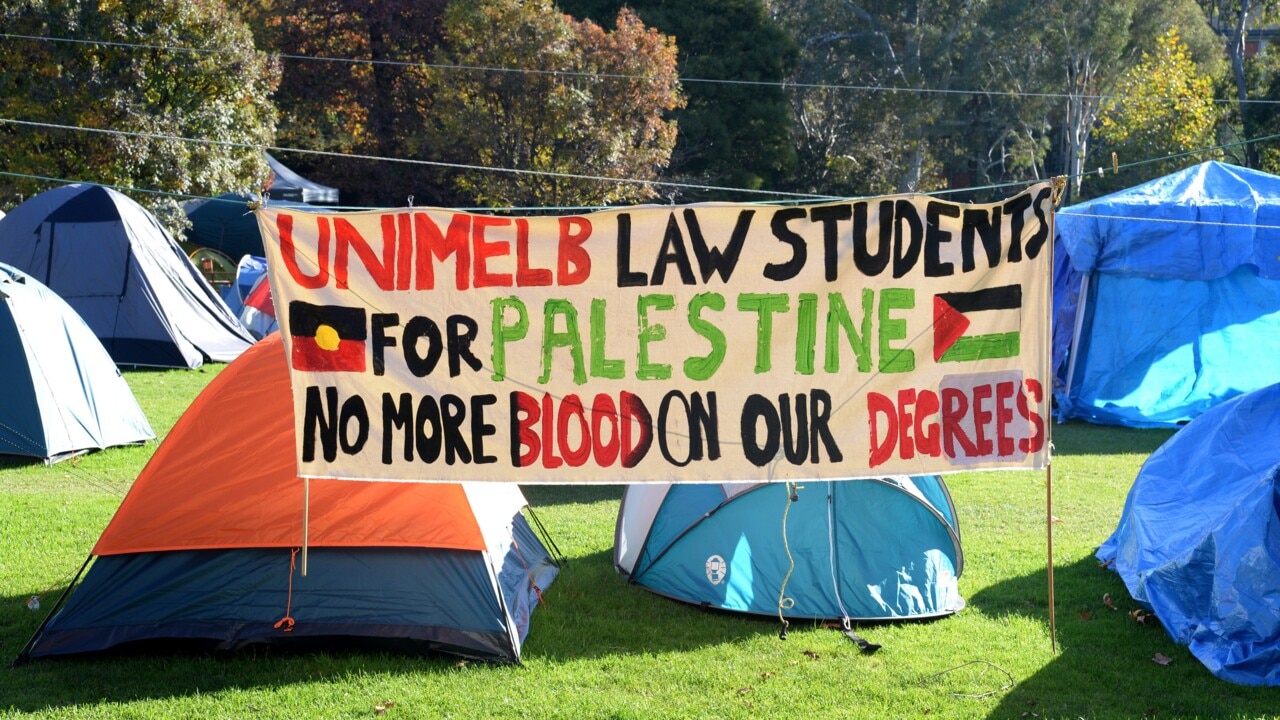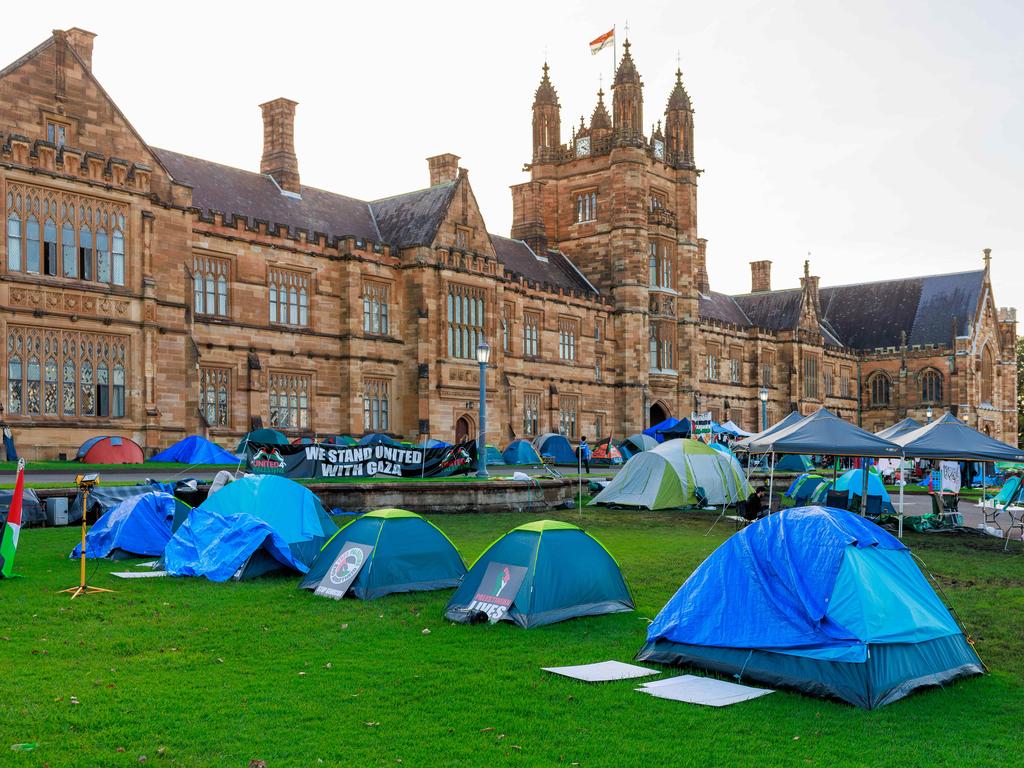‘Menacing anti-Semites in fake keffiyehs’: University of Sydney professor Peter Morgan with courage his uni is missing
A respected University of Sydney professor says he was left shaken and some of his students felt intimidated after his lecture was ‘hijacked’ by several masked pro-Palestinian protesters.

A respected University of Sydney professor says he was left shaken and some of his students felt intimidated after his lecture was “hijacked” by several masked pro-Palestinian protesters – and he has urged vice-chancellor Mark Scott to deal with the “aggression and racism of the pro-Palestinian demonstrators”.
Director of European Studies Peter Morgan said he felt humiliated and was “shaking with anger” after protesters refused to leave his lecture theatre.
Professor Morgan told Professor Scott in a complaint letter on Wednesday he was on the “verge of tears of frustration that after so much warning and so many signs of appalling anti-Semitism this can still be allowed to happen”, adding the “university has effectively encouraged this behaviour”.
He said the broader “intimidation of Jewish students and teachers” on campus by protesters in “phony keffiyehs” sprouting “left-wing anti-Semitism masquerading as political belief” seems acceptable only on university campuses and nowhere else.

The Australian understands it was at least the second University of Sydney lecture disrupted by protesters this week.
In another incident, a Jewish psychology lecturer forcefully and repeatedly asked a group of protesters to leave, with the male demonstrator and the female lecturer standing very close to each other and exchanging tense words. It is understood the university has offered for security personnel to attend her lectures.
Professor Morgan, who is not Jewish but is part of a group of university staff against anti-Semitism, asked Professor Scott for his “most urgent consideration and action on this matter” in the letter.

On Thursday afternoon, following a media inquiry from this publication, Professor Scott sent an email to all staff outlining “unacceptable conduct”, which included “interrupting classes or not allowing classes to commence at the scheduled time”, “deliberately covering their faces in a manner intended to conceal their identity” and “acting in a way that can reasonably be considered to be intimidatory of staff and/or students”.
“We will continue to take a reasonable and proportionate approach to any alleged misconduct and deal with unacceptable conduct on a case-by-case basis, consistent with our approach of de-escalation,” he said.
In a separate note to students and staff, Professor Scott said he had become aware of protesters entering buildings and harassing staff in recent days, and they were “investigating these violations of our policies in the usual way.”
Professor Scott’s office has been communicating with Professor Morgan since the complaint and has asked for help identifying the students involved.
Separately, the Group of Eight Universities said in a statement they would back the Australian Human Rights Commission review into racism.
“Our universities utterly reject all expressions of hate and prejudice, including anti-Semitism, Islamophobia, or any other form of racism or religious intolerance. This is not acceptable in broader Australian society – nor will we accept it on our campuses,” the statement reads.
Professor Morgan said when he arrived to his lecture on Great Books and Radical Texts on Tuesday, three students, “unidentifiable due to the keffiyehs which conveniently render them anonymous”, and one unmasked student were “haranguing” the 80 students in his class.
“The unmasked protester was addressing the students loudly and aggressively using the language and terminology that we are all familiar with.”

He said he asked then demanded the protesters leave but the student spoke louder and gestured for him to stop interrupting.
He said it “became heated” and he was unable to reach university security by phone.
“The speaker then shouted me down, accusing me of political cowardice and of supporting genocide. He was verging on physical menace. I again insisted, now extremely angry, that they get out of the lecture hall immediately, at which they began to move away, chanting ‘for shame’.”
He said the intention of the protesters “was evidently to belittle or humiliate me before my students” and that one student said afterwards he “felt intimidated”. Other students supported the protesters or were silent.
Several days later, his anger was still palpable. “I’m not going to put up with a student haranguing me and speaking to me in that tone of voice … in front of 80 of the brightest students in the university,” he said, adding the university needed to be very clear about what crosses the line and humiliating staff and haranguing students “is not fine”.

Associate Professor Andy Smidt, the NSW state co-ordinator for 5A (Australian Academic Alliance Against Anti-Semitism), which has about 50 members at the University of Sydney, most of whom are Jewish, said they had written repeatedly to Professor Scott about what they deemed unacceptable incidents involving staff since the October 7 attack on Israel, and as recently as May 10.
This included a Jewish staff member who ran into a rally after leaving her office, and faced people “laughing in her face” and shouting that “Israel is a terrorist state”, making her feel “intimidated and very scared.
“What we’re asking for is if they can’t close the encampment (and) put all teaching online for the remainder of the semester so that any staff member or student who does not feel comfortable is able to access learning or teaching materials online,” she said.
The encampment leaders were contacted for comment.






To join the conversation, please log in. Don't have an account? Register
Join the conversation, you are commenting as Logout